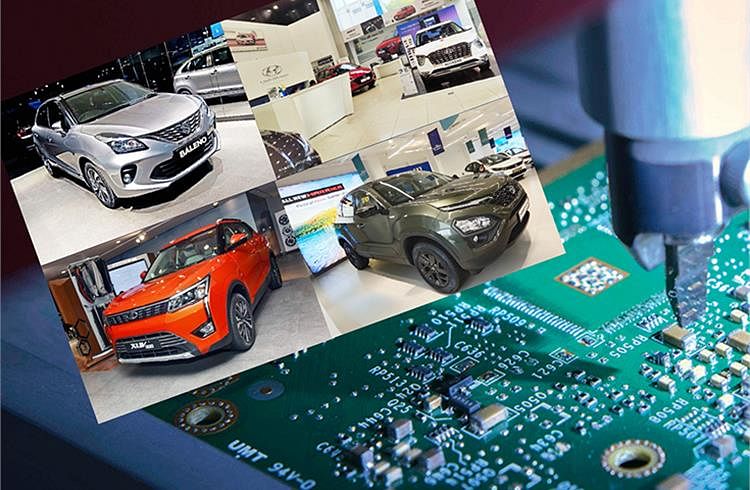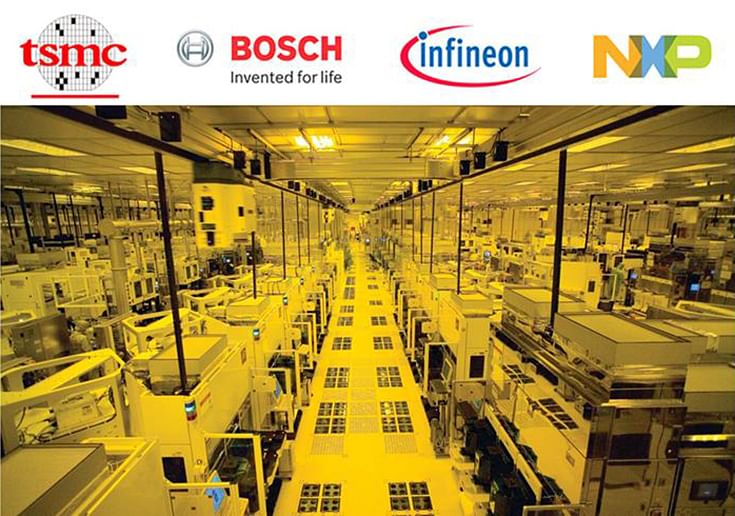CY2024 to be year of inventory reduction for automotive chip suppliers: Synaptics CEO
The global automotive industry, which had grappled with the vexing chip shortage for 18 months until the first half of 2023, should have a smooth run this year with high inventory at Tier-1 suppliers and semiconductor fabricators. The challenge though remains in the 12nm-and-above segment, where there is no additional capacity coming on stream, says Michael Hurlston, CEO of Synaptics.
The global automotive industry, which has driven into 2024 with strong vehicle sales numbers, is set to also benefit from ample supplies of semiconductor chips which, not too long ago, had curtailed production and compelled OEMs to keep their focus on more profitable models.
For nearly 18 months from early 2020 through to mid-2021, vehicle manufacturers gingerly navigated the vexing chip shortage issue which left the industry close to being chip-wrecked. Market dynamics were also at play and to chip manufacturers, the automotive industry was just another customer – and not a very big one at that. In fact, it is understood that as OEMs drastically cut down on production and cancelled their advance bookings for chips in 2020, chip makers found willing recipients for their products in global manufacturers of laptops, cellphones and games consoles, which saw demand soar during lockdowns and the work-at-home. Semiconductor fabrication giants such as TSMC of Taiwan diverted their capacities towards advanced-process-node chips prevalent in modern electronic devices for personal use.
Chips are now a lifeline for connected vehicles and a modern car has multiple chips within its ECUs, which govern a host of applications from engine management to windows, airbags, infotainment, ABS, lighting and, active safety aids like ADAS. And the number of chips keeps rising with every new-generation model.
As the pandemic eased and lockdowns were lifted, vehicle sales particularly cars began witnessing a strong comeback around mid-CY2021 as people sought safe avenues for personal mobility. This robust and heightened resurgence in demand caught Automotive Inc in India and globally napping, and led to a mega demand-supply mismatch over several months, with customers waiting endlessly for their new cars. The semiconductor industry, which works in long-gestation formats and had already confirmed most of its future production allocated to the consumer electronics industry, was unable to respond speedily to this unexpected revival in demand for automotive chips.
This led to a number of leading automotive component suppliers and carmakers shelving production, and shipping cars without key equipment like infotainment, due to the paucity of critical chips. While it took nearly two years for India’s passenger vehicle industry to bounce back and reach pre-Covid levels in September 2022 and a new high of 355,946 units, the real respite came around the second half of CY2023, when most component and carmakers were confident of finally coming out of the woods.

Passenger vehicle market leader Maruti Suzuki India (MSIL), which had reported hefty quarter-on-quarter production losses until March 2023, projected ease in chip supplies from July onward. In a media interaction in September 2023, Shashank Srivastava, Senior Executive Officer, Marketing and Sales, MSIL, had said: “Most manufacturers have surpassed the semiconductor issue, and are gearing for the anticipated demand during the festive season.”
Tarun Garg, COO, Hyundai Motor India, had concurring views as Srivastava: “The chip shortage is more or less over, and while the current situation is looking very stable, one never knows.”
Providing perspective on the current chip market scenario and its impact on the global automotive industry is Michael Hurlston, CEO of the US-based Synaptics which partners some of the world’s most innovative intelligent system providers.
According to Hurlston, “The supply constraints in the near-term are over. The entire supply chain was on a buying spree in the last two years to safeguard chips and, in the process, has built a huge level of inventory. We expect that inventory to bleed off in CY2024.”
However, Hurlston cautioned that the semiconductor technology’s progress towards advanced process-node chips (12 nanometre and below), has created a capacity gap for older chips (above 12nm) that continue to remain relevant for long-term and reliable use cases for applications such as automotive. “While there are inventory build-ups happening on the advanced process-node front, the challenge remains in the 12nm-and-above segment, where there is no additional capacity coming online.”

TSMC Bosch, Infineon Technologies and NXP Semiconductors have announced a plan to jointly invest in European Semiconductor Manufacturing Co to provide advanced semiconductor manufacturing services and to support the future capacity needs of the fast-growing automotive industry..
Mature nodes in short supply
In an earlier interaction with Autocar Professional, Jeremy Bouchaud, Director, Autonomy and E/E & Semiconductor, S&P Global Mobility, had said that there is insufficient capacity at semiconductor manufacturers to produce chips that fall in the 200nm-12nm or the mature-process-node range, and that there has been only 15% capex infusion in capacities to build older-generation process node chips in CY2022-23, whereas a majority (85%) of investments of semiconductor fabricators went into augmenting the advanced process-node chip capacities.
Hurlston also cautions that “while 2024 will be a period of inventory bleed off for the entire industry with significantly-improved chip supplies especially in the latter half of CY2024, getting into 2025, we could again see shortages developing around mid-CY2025.”
The heavy inventory that Hurlston referred to is a result of panic buying or what Bouchaud calls the ‘toilet-paper effect.’ “We saw automotive Tier-1s buying just about any chips they could get their hands on, and this distorted the entire supply chain; but it is getting better,” Bouchaud had explained.
According to Hurlston, despite the rapid progress in chip technology towards advanced nodes, cost and chip design are the two critical factors keeping the automotive industry stick to the mature nodes – falling in the 200nm-to-12nm range. “Automotive is extremely cost sensitive and the advanced nodes are typically more expensive. Moreover, analogue circuits like the Synaptics Touch-and-Display Integration (TDDI) driver do not perform well when they are designed on very small, advanced geometries as they then suffer from a lot of signal-to-noise problem, which makes the design more difficult to achieve,” said Hurlston.
As automakers drive into CY2024, captains of industry will heave a sigh of relief that that a product that chip-wrecked production at most OEMs sometime ago will no longer prove a hurdle to manufacture today’s increasingly connected and electrified vehicles which are ravenous for processing power.
TSMC, Bosch, Infineon and NXP plan JV for advanced semiconductor manufacturing in Europe
RELATED ARTICLES
Autoliv Plans JV for Advanced Safety Electronics With China’s HSAE
The new joint venture, which is to be located strategically near Shanghai and close to several existing Autoliv sites in...
JLR to Restart Production Over a Month After September Hacking
Manufacturing operations at the Tata Group-owned British luxury car and SUV manufacturer were shut down following a cybe...
BYD UK Sales Jump 880% in September to 11,271 units
Sales record sets the UK apart as the largest international market for BYD outside of China for the first time. The Seal...






 03 Jan 2024
03 Jan 2024
 6295 Views
6295 Views





 Ajit Dalvi
Ajit Dalvi




